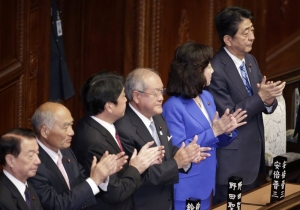TOKYO (AP) — Japanese Prime Minister Shinzo Abe dissolved the lower house of parliament Thursday, paving the way for a snap election on Oct. 22.
Abe is widely seen as trying to reconsolidate his grip on power within the ruling Liberal-Democratic Party, so he can extend the term of his premiership next year. The dissolution of the more powerful of Japan’s two-chamber parliament comes more than a year before required by law.
The ruling party, though, faces a growing challenge from a new party launched by Tokyo Gov. Yuriko Koike this week. The Party of Hope has energized some voters, and is gaining renegade lawmakers from the main opposition party.
The speaker of the house, Tadamori Oshima, read the statement of dissolution. Lower house members all stood up and chanted “banzai” three times in a dissolution ritual, then rushed out of the assembly hall.
Minutes after the dissolution, Abe made a fiery speech to party members. He said he is seeking a public mandate on his tougher diplomatic and defense policies to deal with escalating threats from North Korea and that his party members would have to relay his message to gain support from voters during the campaign.
“This election is about how we protect Japan, the people’s lives and peaceful daily life,” Abe said. “The election is about the future of our children.”
The Cabinet later approved an Oct. 22 election for the 475-seat lower house. The other chamber, the upper house, does not dissolve but is closed until parliament is reconvened after the election.
Support ratings for Abe’s government had plunged to below 30 percent in July following repeated parliamentary questions about allegations that Abe helped his friend obtain approval to open a veterinary college.
Recent media polls show the support ratings recovering to around 50 percent, helped by parliament’s recess and a Cabinet reshuffle in August that removed the defense minister and several other unpopular faces. It’s a significant turnaround from July, when the party suffered a devastating loss in a Tokyo city assembly election to maverick Koike’s new regional party.
According to the Mainichi newspaper poll taken this week and published Thursday, Abe’s party was a top choice among voters at 29 percent, followed by Koike’s party, which came in second at 18 percent and moving ahead of other opposition parties such as the Democratic Party at 8 percent
Analysts say they believe Abe’s ruling party will retain a majority, though some seats may be pulled by Koike’s party. Voters may have difficulty figuring out clear differences in policies between Abe and Koike’s parties, they say. Abe and Koike share nationalistic views and they want to change the war-renouncing Constitution.
The main opposition Democratic Party, which held power in 2009-2012, has lost ground largely due to internal disagreements, and is now falling apart, and many members have defected to Koike’s party.
Democratic leader Seiji Maehara has proposed allowing the remaining members to make their own decision whether to leave or stay, setting the stage for a possible merger with Koike’s party.
AP

